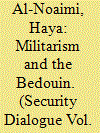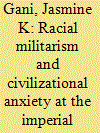|
|
|
Sort Order |
|
|
|
Items / Page
|
|
|
|
|
|
|
| Srl | Item |
| 1 |
ID:
182658


|
|
|
|
|
| Summary/Abstract |
This article investigates the development of militarism in the Arab Gulf using the militarized representation of the Bedouin and their poetic tradition as a site for its analysis. The article traces the ways in which Bedouin ‘martial masculinities’ and Bedouin culture have been appropriated and transformed by British colonialism and postcolonial nationalisms to produce unusual patterns of militarism within the Gulf. It addresses a gap in international relations and security studies literature, in which militarism is examined through state-centric and methodologically nationalist framings that largely overlook transnational and colonial histories. The article argues that contemporary displays of militarism by Qatar and the United Arab Emirates should be read in relation to how colonialism engendered militarism across the Gulf region through the paradoxical representation of the Bedouin as a ‘martial race’ whose martial-ness was also seen as a security ‘threat’ for the colonial/postcolonial state. Militarized responses and rationalities were normalized within Gulf society through the ‘Bedouin warrior’ stereotype, which served as a timeless and fixed construct, connecting the Gulf’s disjointed past to its present-day context. Significantly, the ‘Bedouin warrior’ stereotype helps foster the belief that stability and historical continuity underpin state-modernization processes in Qatar and the United Arab Emirates. The article’s intervention seeks to disrupt this continuity by looking at how militarism and its martial constructs created ruptures in state trajectories, using the example of the 1996 coup attempt, citizen revocations, and the depoliticization of the poetic act as evidence for the claim that militarism engenders particular insecurities for Bedouin populations in the Arab Gulf.
|
|
|
|
|
|
|
|
|
|
|
|
|
|
|
|
| 2 |
ID:
182657


|
|
|
|
|
| Summary/Abstract |
This article explores the neglected connection between race and militarism by focusing on a US missile defense system deployed in South Korea. In September of 2017, the two countries installed the Terminal High Altitude Area Defense system in a rural village. Manufactured by Lockheed Martin, this missile defense system was to protect South Korea from attacks by North Korea. The system is integral to US global military strategy, but from the perspective of human security, its benefits are dubious at best. By drawing on a theory of the ‘racial state’ and critical studies of the US empire-state, the article examines two fundamental practices of the neocolonial military relation between the two states: wartime Operational Control of the South Korean military and extraterritoriality of US bases in South Korea. It argues that these neocolonial practices in which the Terminal High Altitude Area Defense system deployment is embedded reflect ‘the historicist racial ruling’ that denies self-rule for Koreans and its internalization by Koreans who support the unequal military relation. It also analyzes how the South Korean racial state promotes internal homogeneity and otherizes North Korea to bolster national security through the missile defense system.
|
|
|
|
|
|
|
|
|
|
|
|
|
|
|
|
| 3 |
ID:
182659


|
|
|
|
|
| Summary/Abstract |
In this article, I ask three key questions: First, what is the relationship between militarism and race? Second, how does colonialism shape that relationship to produce racial militarism on both sides of the imperial encounter? And, third, what is the function of racial militarism? I build on Fanon’s psychoanalytic work on the production of racial hierarchies and internalization of stigma to argue that militarism became a means through which the European imperial nation-state sought to mitigate its civilizational anxiety and assert itself at the top of a constructed hierarchy. In particular, I argue that European militarism is constituted by its colonization and historical constructions of the so-called Muslim Orient, stigmatized as a rival, a threat and an inferior neighbour. However, this racial militarism and civilizational anxiety is not only a feature of the colonial metropole, but also transferred onto colonized and postcolonial states. Drawing on examples of racial militarism practised by the Syrian regime, I argue Europe’s racial-militarist stigmas are also internalized and instrumentalized by postcolonial states via fleeing and transferral. Throughout the article, I demonstrate that racial militarism has three main functions in both metropole and postcolony: the performance of racial chauvinism and superiority; demarcation of boundaries of exclusion; and dehumanization of racialized dissent in order to legitimate violence.
|
|
|
|
|
|
|
|
|
|
|
|
|
|
|
|
| 4 |
ID:
182655


|
|
|
|
|
| Summary/Abstract |
The past ten years have witnessed a revival in scholarship on militarism, through which scholars have used the concept to make sense of the embeddedness of warlike relations in contemporary liberal societies and to account for how the social, political and economic contours of those same societies are implicated in the legitimation and organization of political violence. However, a persistent shortcoming has been the secondary role of race and coloniality in these accounts. This article demonstrates how we might position racism and colonialism as integral to the functioning of contemporary militarism. Centring the thought and praxis of the US Black Panther Party, we argue that the particular analysis developed by Black Panther Party members, alongside their often-tense participation in the anti–Vietnam War movement, offers a strong reading of the racialized and colonial politics of militarism. In particular, we show how their analysis of the ghetto as a colonial space, their understanding of the police as an illegitimate army of occupation and, most importantly, Huey Newton’s concept of intercommunalism prefigure an understanding of militarism premised on the interconnections between racial capitalism, violent practices of un/bordering and the dissolving boundaries between war and police action.
|
|
|
|
|
|
|
|
|
|
|
|
|
|
|
|
| 5 |
ID:
182656


|
|
|
|
|
| Summary/Abstract |
What makes violence martial? Contemporary militarism scholarship, owing to an analytical overdetermination of the role of military institutions, frequently conflates martiality with violence writ large. Drawing upon the illustrative case of Adopt A Sniper, a US military support charity founded by police officers operating during the global war on terror and intended to help supporters ‘directly contribute to the killing of the enemy’, this article interrogates the intuitive ‘line’ between martial and other, particularly colonial, forms of violence. To do so, I develop the concept of ‘normative imaginaries of violence’ – articulations of intersubjective beliefs; political community; spatial geographies; gendered, sexualized, racialized and classed power relations; and logics of legitimation. Through this lens, and informed by the work of Frantz Fanon, the article demonstrates that though coloniality and martiality are deeply intertwined, they are neither reducible to nor epiphenomenal of each other. Through a juxtaposition of the titular sniper with two additional figures invoked by Adopt A Sniper – the militiaman and the vigilante – I outline a novel, genealogical method that enables us to trace the entangled histories of contemporary violences and identify the implicit politics of ordering at work in existing, often fragmented, analyses of political violence.
|
|
|
|
|
|
|
|
|
|
|
|
|
|
|
|
|
|
|
|
|